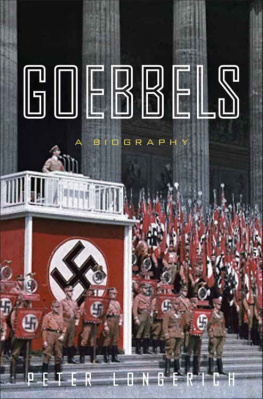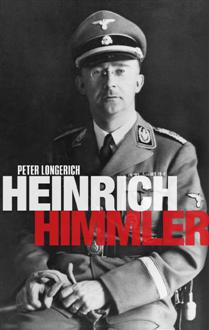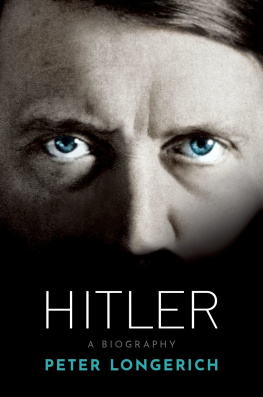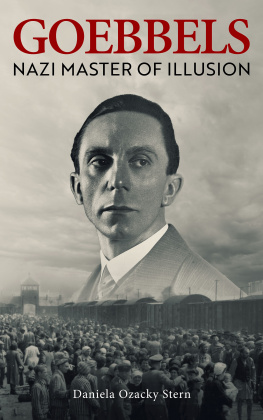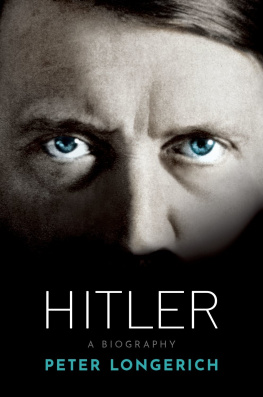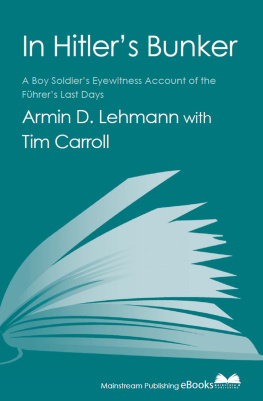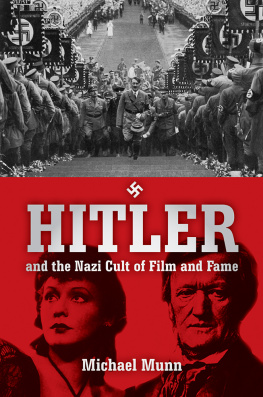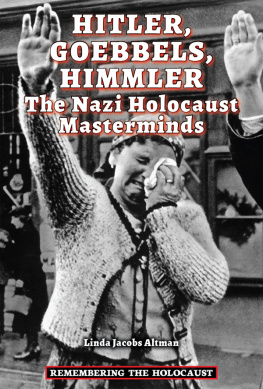Peter Longerich - Goebbels: A Biography
Here you can read online Peter Longerich - Goebbels: A Biography full text of the book (entire story) in english for free. Download pdf and epub, get meaning, cover and reviews about this ebook. year: 2015, publisher: Random House, genre: Non-fiction. Description of the work, (preface) as well as reviews are available. Best literature library LitArk.com created for fans of good reading and offers a wide selection of genres:
Romance novel
Science fiction
Adventure
Detective
Science
History
Home and family
Prose
Art
Politics
Computer
Non-fiction
Religion
Business
Children
Humor
Choose a favorite category and find really read worthwhile books. Enjoy immersion in the world of imagination, feel the emotions of the characters or learn something new for yourself, make an fascinating discovery.
- Book:Goebbels: A Biography
- Author:
- Publisher:Random House
- Genre:
- Year:2015
- Rating:3 / 5
- Favourites:Add to favourites
- Your mark:
Goebbels: A Biography: summary, description and annotation
We offer to read an annotation, description, summary or preface (depends on what the author of the book "Goebbels: A Biography" wrote himself). If you haven't found the necessary information about the book — write in the comments, we will try to find it.
In life, and in the grisly manner of his death, Joseph Goebbels was one of Adolf Hitlers most loyal acolytes. By the end, no one in the Berlin bunker was closer to the Fhrer than his devoted Reich minister for public enlightenment and propaganda. But how did this clubfooted son of a factory worker rise from obscurity to become Hitlers most trusted lieutenant and personally anointed successor?
In this ground-breaking biography, Peter Longerich sifts through the historical recordand thirty thousand pages of Goebbelss own diary entriesto provide the answer to that question. Longerich, the first historian to make use of the Goebbels diaries in a biographical work, engages and challenges the self-serving portrait the propaganda chief left behind. Spanning thirty years, the diaries paint a chilling picture of a man driven by a narcissistic desire for recognition who found the personal affirmation he craved within the virulently racist National Socialist movement. Delving into the mind of his subject, Longerich reveals how Goebbelss lifelong search for a charismatic father figure inexorably led him to Hitler, to whom he ascribed almost godlike powers.
This comprehensive biography documents Goebbelss ascent through the ranks of the Nazi Party, where he became a member of the Fhrers inner circle and launched a brutal campaign of anti-Semitic propaganda. Though endowed with near-dictatorial control of the mediafilm, radio, press, and the fine artsLongerichs Goebbels is a man dogged by insecurities and beset by bureaucratic infighting. He feuds with his bitter rivals Hermann Gring and Alfred Rosenberg, unsuccessfully advocates for a more radical line of total war, and is thwarted in his attempt to pursue a separate peace with the Allies during the waning days of World War II. This book also reveals, as never before, Goebbelss twisted personal lifehis mawkish sentimentality, manipulative nature, and voracious sexual appetite.
A harrowing look at the life of one of historys greatest monsters, Goebbels delivers fresh insight into how the Nazi message of hate was conceived, nurtured, and disseminated. This complete portrait of the man behind that message is sure to become a standard for historians and students of the Holocaust for decades to come.
Praise for Goebbels
Peter Longerich . . . has delved into rarely accessed material from his subjects diaries, which span thirty years, to paint a remarkable portrait of the man who became one of Hitlers most trusted lieutenants.The Daily Telegraph
Praise for Heinrich Himmler
There have been several studies of this enigmatic man, but Peter Longerichs massive biography, grounded in exhaustive study of the primary sources, is now the standard work and must stand alongside Ian Kershaws Hitler, Ulrich Herberts Best and Robert Gerwarths Hitlers Hangman: The Life of Heydrich as one of the landmark Nazi biographies. As the author of a celebrated study of the Holocaust, Longerich is better able than his predecessors to situate Himmler within the vast machinery of genocide. And he brings to his task a gift for capturing those mannerisms that are the intimate markers of personality.London Review of Books
[An] excellent and comprehensive biography.The New York Review of Books
Peter Longerich: author's other books
Who wrote Goebbels: A Biography? Find out the surname, the name of the author of the book and a list of all author's works by series.

